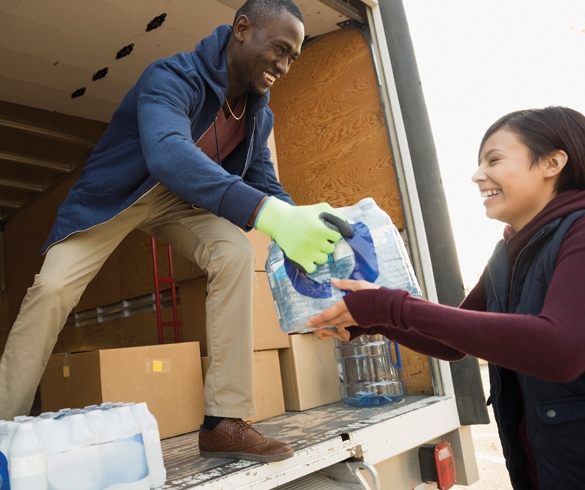
7 Ways to Help Hurricane Victims
Natural disasters come in multiple forms and can quickly devastate many lives in a matter of moments. While they all can cause nightmares for those affected, few are as powerful and destructive as hurricanes.
That’s why, when hurricanes make landfall and wreak havoc, help is immediately needed and accepted by the people and communities impacted the most. Here are a few ways you can make a positive impact for those affected by natural disasters, specifically hurricanes:
Start a Fundraiser
One of the most potentially impactful ways to lend a hand after a natural disaster is to start a community fundraiser. This can be as simple as an online account accepting donations for a group of people and sending a large sum to a relief organization, or as thought-out as a large-scale event, like a raffle or dinner, accepting donations for entry.
Donate
Money is typically the resource relief organizations can use the most during natural disasters, and it can also be the easiest way for people to lend aid. There are typically many trustworthy organizations available to donate to during times of need.
Promote Fundraising Efforts
After you’ve made a donation yourself, spread the word to others whether it’s via word of mouth, social media or other forms of communication. Let friends and family know how they can join the cause.
Volunteer
While it isn’t viable for everyone, some people closer to the affected region can directly help those in need with physical help at the place it’s most needed. Whether it’s passing out supplies, serving food to those displaced or other means of lending a hand, volunteers are a valuable resource following natural disasters.
Provide Shelter
Another option for people looking to help who are closer to the devastation is to offer shelter, especially if they have family members or friends who have been affected. Assisting at places sheltering the displaced is another way to provide help, if offering space in your home is not an option.
Give Blood
Injuries can be unavoidable when hurricanes and other disasters strike. One way to help those hospitalized or otherwise injured is to donate blood, possibly saving lives in the process.
Stay Persistent
In the immediate aftermath of storms and natural disasters, the news cycle is dominated by stories of triumph and despair, and by ways people can help. However, the storm is eventually overshadowed by other, more recent news. One major way people can help after a hurricane is by continuing their support long after the storm has passed, as those affected will need assistance, supplies and donations for much longer than just a couple of weeks after the incident. As time passes, it can be helpful to continue donating money and supplies, committing to helping physically rebuild structures and promoting fundraising efforts.
Find more ways to help those in need at eLivingToday.com.
Staying Safe Through a Hurricane
While the immense power of hurricanes and tropical storms can greatly affect the lives of many in an instant, there are ways to increase your safety before, during and after the storm. These tips from the American Red Cross can help protect yourself and your family.
Before
- Put together an emergency kit, including basic but crucial items such as: water, food, a first aid kit, cell phones with chargers, contact information for family and friends, flashlights, extra batteries, medications, radios, copies of key personal documents, extra cash and maps.
- Working with your family, create an evacuation plan for your home. This includes discussing how to prepare and respond to emergencies, identifying the responsibilities of each person in the home and practicing the plan.
- As a storm is approaching, stay tuned to local radio or TV stations for the latest updates.
- Be prepared to evacuate quickly, and ensure that your emergency kit and other necessities are ready.
During
- Stay inside.
- If power is lost, use flashlights in the dark rather than candles.
- If possible, keep radio or TV stations tuned in for any new or developing information.
- Because waters could be contaminated with sewage or contain other dangerous substances, avoid contact with floodwater.
- If instructed to do so by local authorities, shut off the power and water mains.
- If you must be outdoors, don’t walk, swim or drive through floodwater. Don’t walk on beaches or riverbanks, and don’t allow children to play in or near floodwater.
- Stay out of areas subject to flooding, such as underpasses, dips and low spots.
- If you must drive and are caught on a flooded road with rising waters, get out of the car and move to higher ground.
After
- Communicate with family and friends to let them know you’re safe.
- If you are evacuated, don’t return until authorities confirm it is safe to do so.
- Continue listening to radio or TV stations for new or developing information.
- Be prepared for continued rainfall and additional flooding.
- Don’t use water that could be contaminated.
- If possible, help friends, family and neighbors who require assistance, especially the elderly, people without transportation, large families and people with disabilities.
- When returning home, stay away from buildings that have water around them.
- Stay away from dangling power lines and report them to power companies.
- For insurance purposes, take pictures of home and item damage.
- When cleaning your home, wear protective clothing like rubber gloves and boots, and be cautious.
- Inquire with professionals to check for roof damage and other more technical tasks.
Source:
eLivingToday.com









